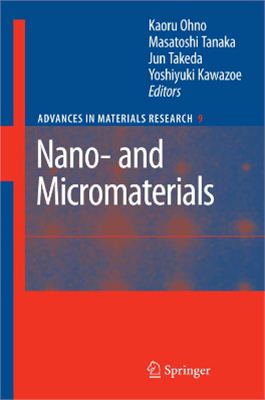Springer, Berlin, 2008, 337 pages
The future focus of nanotechnology will be on realizing new functions over greater scales. This book describes the creation of nano- and microscale structures and functions by controlling temperature, light, pressure, or carrier injections. It covers novel nano-integration technologies such as quantum-well devices possilbe by utilizing, for example, the self-organization of surface nanostructures and optically or pressure-induced phase transitions, micro machines using microstereolithography, as well as new techniques of laser spectroscopy and new computational methods for estimating atomic and electronic structures and their functions on the nano- and microscales.
Nanometer-Scale Structure Formation on Solid Surfaces
Ultrafast Laser Spectroscopy Applicable to Nano- and Micromaterials
Defects in Anatase Titanium Dioxide
Organic Radical 1,3,5-Trithia-2,4,6-Triazapentalenyl (TTTA) as Strongly Correlated Electronic systems: Experiment and Theory
Ab Initio GW Calculations Using an All-Electron Approach
First-Principles Calculations Involving Two-Particle Excited States of Atoms and Molecules Using T-Matrix Theory
Green’s Function Formulation of Electronic Transport at Nanoscale
Self-Assembled Quantum Dot Structure Composed of III–V Compound Semiconductors
Potential-Tailored Quantum Wells for High- Performance Optical Modulators/Switches
Thermodynamic Properties of Materials Using Lattice-Gas Models with Renormalized Potentials
Optically Driven Micromachines for Biochip Application
Study of Complex Plasmas
The future focus of nanotechnology will be on realizing new functions over greater scales. This book describes the creation of nano- and microscale structures and functions by controlling temperature, light, pressure, or carrier injections. It covers novel nano-integration technologies such as quantum-well devices possilbe by utilizing, for example, the self-organization of surface nanostructures and optically or pressure-induced phase transitions, micro machines using microstereolithography, as well as new techniques of laser spectroscopy and new computational methods for estimating atomic and electronic structures and their functions on the nano- and microscales.
Nanometer-Scale Structure Formation on Solid Surfaces
Ultrafast Laser Spectroscopy Applicable to Nano- and Micromaterials
Defects in Anatase Titanium Dioxide
Organic Radical 1,3,5-Trithia-2,4,6-Triazapentalenyl (TTTA) as Strongly Correlated Electronic systems: Experiment and Theory
Ab Initio GW Calculations Using an All-Electron Approach
First-Principles Calculations Involving Two-Particle Excited States of Atoms and Molecules Using T-Matrix Theory
Green’s Function Formulation of Electronic Transport at Nanoscale
Self-Assembled Quantum Dot Structure Composed of III–V Compound Semiconductors
Potential-Tailored Quantum Wells for High- Performance Optical Modulators/Switches
Thermodynamic Properties of Materials Using Lattice-Gas Models with Renormalized Potentials
Optically Driven Micromachines for Biochip Application
Study of Complex Plasmas

